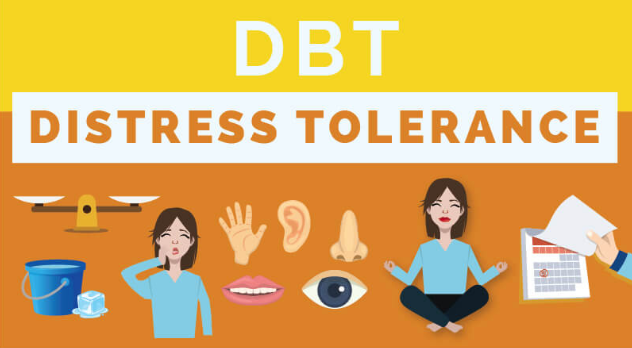I hope you are enjoying your summer.
Have you noticed that sometimes your contentment in life gets interrupted by unpleasant and negative thoughts, either about yourself or others or about a situation? As you know, right now we are going through an unprecedented time, where we have to conform to rules and regulations that serve to protect us but that also restrict our freedom to move about and interact with others. It’s not easy to deal with this even though we know it is in our best interest. This can cause frustration and stress.
This edition of the Newsletter is designed to help you better cope with negative and distressing thoughts and feelings such as these, and others. I am going to tell you about a powerful modality called Dialectical Behavioral Therapy (DBT) designed by a Psychologist to help you manage difficult situations.
DBT was initially created by Dr. Marsha Linehan to treat patients with borderline personality disorder who were suicidal. It was also found to help people with other psychological conditions such as depression, PTSD, substance abuse, and eating disorders. And research has shown that DBT works in NON-clinical settings to help anyone develop better emotional and interpersonal skills. It has components from Cognitive Behavioral Therapy (CBT) and includes “two acceptance-oriented skills (mindfulness and distress tolerance) and two change-oriented skills (emotion regulation and interpersonal effectiveness).” ¹ ²
The 4 core “behavioral skill modules” of DBT are:
* “Mindfulness: the practice of being fully aware and present in this one moment
* Distress Tolerance: how to tolerate pain in difficult situations, not change it
* Interpersonal Effectiveness: how to ask for what you want and say no while maintaining self-respect and relationships with others
* Emotion Regulation: how to decrease vulnerability to painful emotions and change emotions that you want to change” ¹
How can you use DBT to deal with fear, anxiety, frustration and/or stress especially about the current situation in the world?
One powerful DBT tool to use in this instance is called “Radical Acceptance.”
Radical Acceptance
Radical Acceptance according to Dr. Linehan, is used “when you cannot keep painful events and emotions from coming your way.” It’s about accepting reality as it is. As Dr. Linehan says, “refusing to accept reality can keep you stuck in unhappiness, bitterness, anger, sadness, shame, or other painful emotions. ³
1. “Radical means all the way, complete and total.”
2. “It is accepting in your mind, heart and body.”
3. To thoroughly accept what is, when things are not the way you want it, and “to let go of bitterness.” ³
Using DBT to deal with the stress and frustration of the Covid-19 crisis would be to accept things as they are, and to decrease your risk of getting sick by wearing masks, socially distancing, and living a healthy lifestyle.
Employing the technique of Radical Acceptance can be difficult especially when we have life altering events such as the death of a loved one, or the breakup of an intimate relationship.
However, as Lisa Wessan, LICSW, and DBT specialist says, …”Radical Acceptance is the ability to embrace the paradoxes, absurdities and incongruities of your life without having a meltdown. When you judge (yourself, others or the Universe), it weakens and exhausts you, so you cannot be as effective as you could be in your life. Learning the Radical Acceptance skills in DBT gives you the tools to allow, accept and let go of uncomfortable thoughts, while not denying or condoning them. Using Radical Acceptance skills, you will know a new freedom and inner peace, and function better in your life.”

Image from http://www.sunrisertc.com/distress-tolerance-skills/
The Next tool I will teach you for Distress Tolerance is the STOP Method.
Use this technique when you are stressed and overwhelmed and want to react and act out, but doing so could have negative consequences.
STOP Technique
Stop—Literally stop what you are doing. Do not move.
Take a step back—Taking a step back from a situation and pause; Hold off on being impulsive.
Observe—what you are feeling and thinking; and notice what is happening around you.
Proceed mindfully—Ask your “Wise Mind”—what the best course of action is. ⁴
There are many websites to learn about DBT and to find therapists and practitioners who are trained to teach it. It is best learned in a group setting.
It is my hope that one day DBT Skills will be taught in all schools, and be used to empower students to become human beings who are thoughtful, responsive, and able to love themselves, and in doing so, make the world a better place.
Stay tuned for an upcoming exciting email about my book!
Have a beautiful weekend and please stay safe.
With warmest regards,
Dr. Jill
Sign Up For My Newsletter
References
2. https://behavioraltech.org/resources/resources-for-clients-families/#what-is-dbt
Resources
https://behavioraltech.org/ –This is Dr. Marsha Linehan’s website
http://www.selfinjury.bctr.cornell.edu/perch/resources/what-is-emotion-regulationsinfo-brief.pdf

